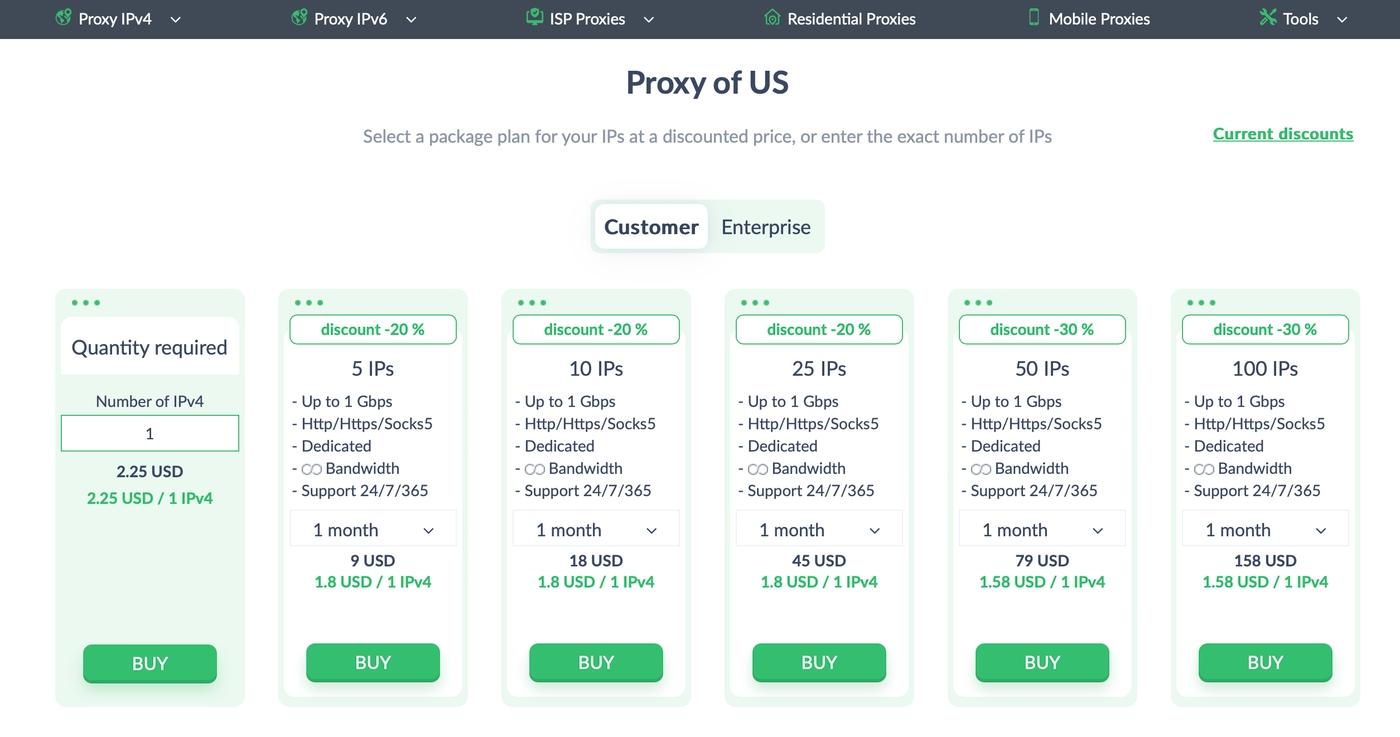Proxy-Seller Key features
| Proxy Types | Residential Datacenter ISP Mobile |
| Suitable For | Individuals Small/medium/large businesses |
| Free Trial | 3-day trial (200MB) for $1.99 |
| Price Range | From $7.00/month – residential proxies From $1.15/month – ISP proxies From $0.75/month – datacenter proxies From $25/month - mobile proxies |
| Features | Worldwide proxy network Self-service dashboard Configuration assistance 1 Gbps high-speed channels 24-hour refund or replacement 24/7 customer support |
| Protocols | HTTP HTTPS SOCKS5 |
| IP Rotation | Rotating and sticky sessions |
| Uptime | 99% |
| IP Pool | 20M+ |
| Countries / Locations | 220+ (USA, UK, Brazil, Spain, Japan, Germany, Poland, France, and more) |
| Additional Tools & Products | Proxy checker Port scanner Ping scanner IP address checker IP tracker |
| Browser Extensions | N/A |
| Integrations | Web proxy managers Web scraping tools Sneaker bots SEO tools Multi-accounting tools |
| Documentation and Knowledge Base | Setup guides Technical documentation FAQ Blog |
| Customer Support | Online chat (available 24/7) |
About Proxy-Seller
Per the information on its site, Proxy-Seller launched in 2014, making it a time-proven proxy provider. The company behind it is called “Proxy-Seller SSV IT Provider Online Services LTD,” based in Cyprus. It initially focused on customers from the Eastern European region, as evidenced by the many Russian-language pages of its websites that are still online. That said, it now serves customers from around the entire world.
Proxy-Seller focuses on the basics. It offers residential, datacenter, ISP, and mobile proxies. Its networks are vast, spanning around 220 countries and having a considerable number of exit nodes. Proxy-Seller also offers some essential tools for checking IPs and proxies online, but you won’t find any additional services.
Therefore, Proxy-Seller focuses on those who need high-quality proxies. Thanks to its low entry barrier, it’s suitable for individual users. However, its subscription plans scale up to enterprise levels. Plus, numerous publicly available user reviews testify that Proxy-Seller is a genuine and high-quality proxy provider, which we’ll also inspect throughout this review.
Proxy Server Types
We’re happy to report that Proxy-Seller offers any imaginable proxy type. You can expect to find a vast network of residential proxies, as well as IPv4 and IPv6 datacenter proxies. There are also ISP and mobile proxies, making Proxy-Seller suitable for an extensive range of uses.
Residential Proxies
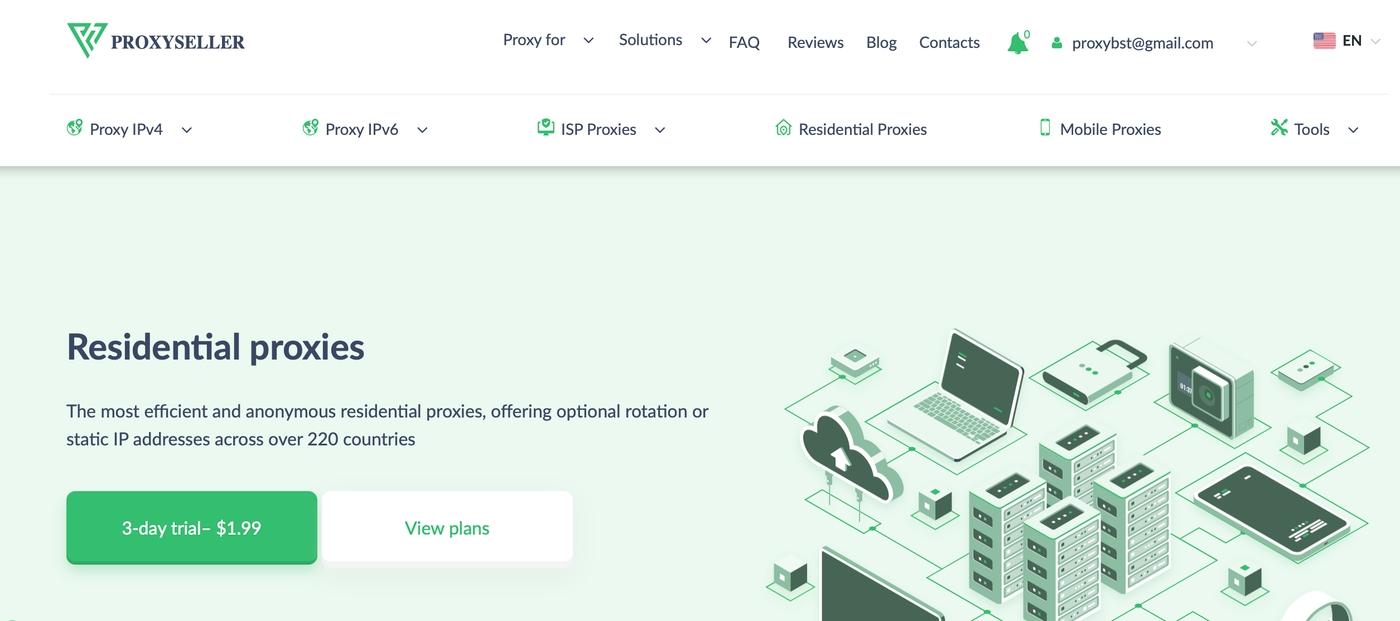
| Type | Individual |
| Payment | Per IPs |
| Locations | 50+ |
| Protocols | HTTP, HTTPS, SOCKS5 |
| Use Cases | Web scraping SEO monitoring Price tracking and monitoring |
Proxy-Seller has more than 20 million residential proxies in more than 220 countries. Even though it doesn’t offer the highest number of proxies compared to its competitors, it’s evident that the scope of its network is vast. What sets this provider apart is the ability to target specific countries, cities, and even ISPs.
Don’t expect any limits on parallel threads or ports. Also, you’ll find flexible rotation options with the ability to create up to 60-minute-long sticky sessions. You can also force rotation for all sessions, which is helpful when encountering web scraping blocks/errors. HTTP, HTTPS, and SOCKS5 proxies are supported, as well as various ways of user authentication.
Datacenter Proxies
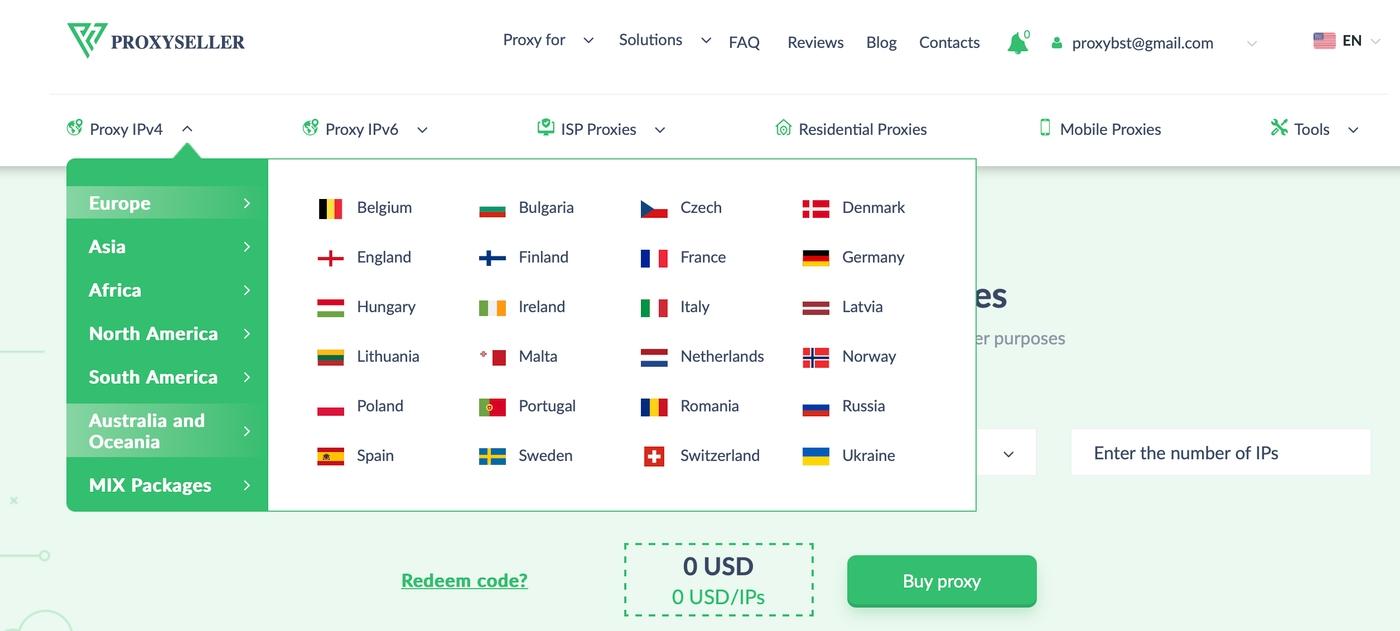
| Type | Individual |
| Payment | Per IPs |
| Locations | 50+ |
| Protocols | HTTP, HTTPS, SOCKS5 |
| Use Cases | Web scraping SEO monitoring Price tracking and monitoring |
Unlike most other providers, Proxy-Seller lets you obtain datacenter proxies from individual countries or a mix of countries. So, you won’t be able to access its entire network in one go. However, you’re free to buy multiple packages based on the location of your targets. You get unlimited bandwidth and unlimited parallel connections.
More good news: Proxy-Seller’s datacenter proxies support HTTP, HTTPS, and SOCKS5 proxies. All its proxies are individual, making them suitable for more advanced scraping efforts. That said, we have to note that this provider’s proxy list is static, which is usable for many use cases, but many other providers offer additional rotation functionality.
ISP Proxies

| Type | Individual |
| Payment | Per IPs |
| Locations | 25+ |
| Protocols | HTTP, HTTPS, SOCKS5 |
| Use Cases | Web scraping Cybersecurity Online gaming |
Similarly to datacenter proxies, Proxy-Seller’s ISP proxies target individual countries and a mix of countries. So, you’ll need to decide on a subscription plan based on the location of your targets. There are around 25 countries on offer, more than half of which are in Europe. Other popular locations worldwide are covered, like the US, Canada, Brazil, China, and India.
Proxy-Seller’s ISP proxies are individual (static). However, you can rotate (replace) them once a month free of charge. There are no traffic or concurrency limitations, and there’s support for HTTP, HTTPS, and SOCKS5 protocols. Also, you get unlimited bandwidth and threads for your chosen subscription period.
Mobile Proxies
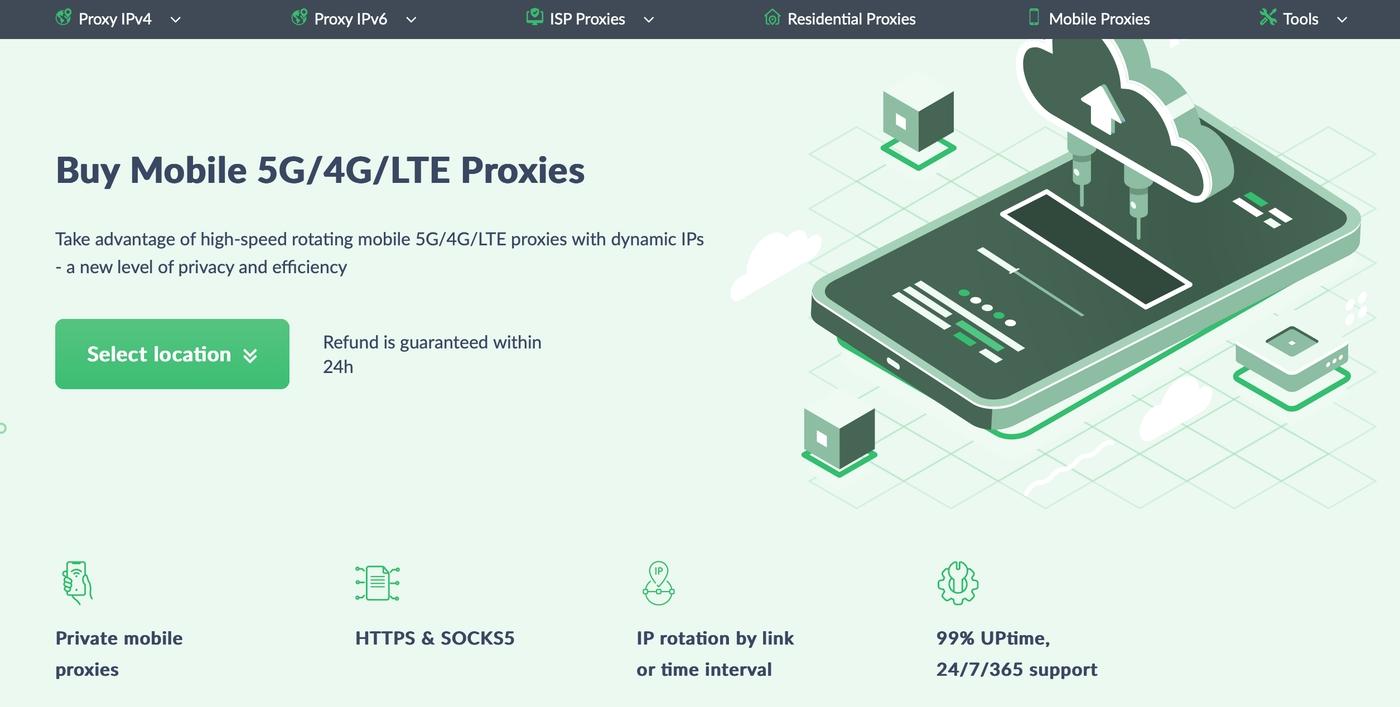
| Type | Individual or shared |
| Payment | Per IPs |
| Locations | 18+ |
| Protocols | HTTP, HTTPS, SOCKS5 |
| Use Cases | Geo-location spoofing Bypassing anti-bot systems |
Regarding mobile proxies, you can pick from shared and dedicated IPs. Dedicated IPs are available across 21 countries, while shared IPs are available from 10 countries. This provider also lets you choose a specific carrier from each country, and the available options are pretty nice. For example, you can select from AT&T (3G), Verizon, and T-Mobile (4G and 5G) in the US.
These proxies rotate automatically every five, 10, or 30 minutes, which means that sticky sessions are an option. However, you can get a limited number of IPs, which makes ISP proxies less than ideal for scraping. On the plus side, they’re great for bypassing strong anti-bot systems. Per the provider’s documentation, regular mobile proxies feature 5 Mbps to 30 Mbps speeds, while 5G proxies can reach up to 100 Mbps.
Pricing and Payment Methods
Proxy-Seller is known for its affordable pricing plans and a wide variety of subscription plans. As such, they’re tailored for individual users but scale up to enterprise plans and those looking for wide-scale scraping operations. In this segment of our Proxy-Seller review, we’ll explain how much each proxy type costs and the available subscription options.
Residential Proxies
 Individual users can choose a pay-as-you-go plan or a predefined subscription plan based on their bandwidth needs. If you wish to avoid a subscription, 1GB costs $7.00. Then, there’s a subscription plan with 3GB, which costs $18.00 per month. You can also get 10GB for $50.00, 25GB for $120.00, 50GB for $235.00, and 100GB for $450.00 per month.
Individual users can choose a pay-as-you-go plan or a predefined subscription plan based on their bandwidth needs. If you wish to avoid a subscription, 1GB costs $7.00. Then, there’s a subscription plan with 3GB, which costs $18.00 per month. You can also get 10GB for $50.00, 25GB for $120.00, 50GB for $235.00, and 100GB for $450.00 per month.
Enterprise users can start at $800.00 per month for 200GB. They can also buy 300GB for $1,050.00, 500GB for $1,500.00, 750GB for $2,175.00, or 1TB for $2,700.00 monthly. A 3TB+ plan is also available, but you must contact the provider for additional information.
Datacenter Proxies
Datacenter proxies are available through a myriad of plans based on how many locations you want to target and whether you want an IPv4 or IPv6 proxy. For example, a US IPv4 proxy plan costs $9.00 for 5 IPs, $18.00 for 10 IPs, $45.00 for 25 IPs, $79.00 for 50 IPs, $158.00 for 100 IPs, $365.00 for 250 IPs, $675.00 for 500 IPs, and $1,012.50 per month for 750 IPs. or you can buy individual IPs for $2.25 monthly.
If you want US IPv6 proxies, you’ll pay significantly lower prices. You can get 10 IPs for $1.60, 50 IPs for $5.50, 500 IPs for $40.00, 2,000 IPs for $120.00, or 5,000 IPs for $250.00 monthly. Buying increments of 10 IPs for $1.60 per month is also possible. Keep in mind that those prices apply to US proxies. You can also choose from other countries, and buying multiple subscription plans is possible.
It’s also possible to get a mix of locations. For example, some plans include worldwide locations, Europe, Asia, or a mix of those locations. A worldwide mix of IPv4 proxies costs $37.50 for 50 IPs, $68.00 for 100 IPs, $150.00 for 250 IPs, $265.00 for 500 IPs, $367.50 for 750 IPs, $450.00 for 1,000 IPs, or $820.00 per month for 2,000 IPs.
The most significant difference between IPv4 and IPv6 proxies is that they don’t cover the same locations. IPv4 proxies cover significantly more locations, and they cost more. You can choose from a mix of countries, while each IPv6 plan is tied to a specific country.
ISP Proxies
Regarding pricing, ISP proxies work similarly to IPv4 datacenter proxies, where you can choose from specific countries or a mix of locations. For example, a US ISP proxy will cost $29.10 for 10 IPs, $71.25 for 25 IPs, $135.00 for 50 IPs, $255.00 for 100 IPs, $600.00 for 250 IPs, $1,125.00 for 500 IPs, or $1,575.00 per month for 750 IPs.
It’s also possible to get a mix of locations. For example, the “Worldwide Mix 1” plan has proxies from the US, Poland, the Netherlands, Brazil, France, Japan, South Korea, and 10+ additional countries. That plan costs $57.50 for 50 IPs, $104.00 for 100 IPs, $196.00 for 200 IPs, $460.00 for 500 IPs, $810.00 for 1,000 IPs, or $1,380.00 per month for 2,000 IPs.
It’s also worth mentioning that ISP proxies, like other proxies offered by Proxy-Seller, can be obtained in larger quantities for enterprise customers. The provider offers some predefined enterprise plans but is also open to custom plans.
Mobile Proxies
The price of a mobile proxy depends on your chosen location, which means that Proxy-Seller has different prices for different countries and even carriers. We’ll take the US, for example. The most affordable option is to get an IP belonging to AT&T (3G). In that case, you’ll pay $33.00 for 7 days, $65.00 per month, and $663.00 for a year.
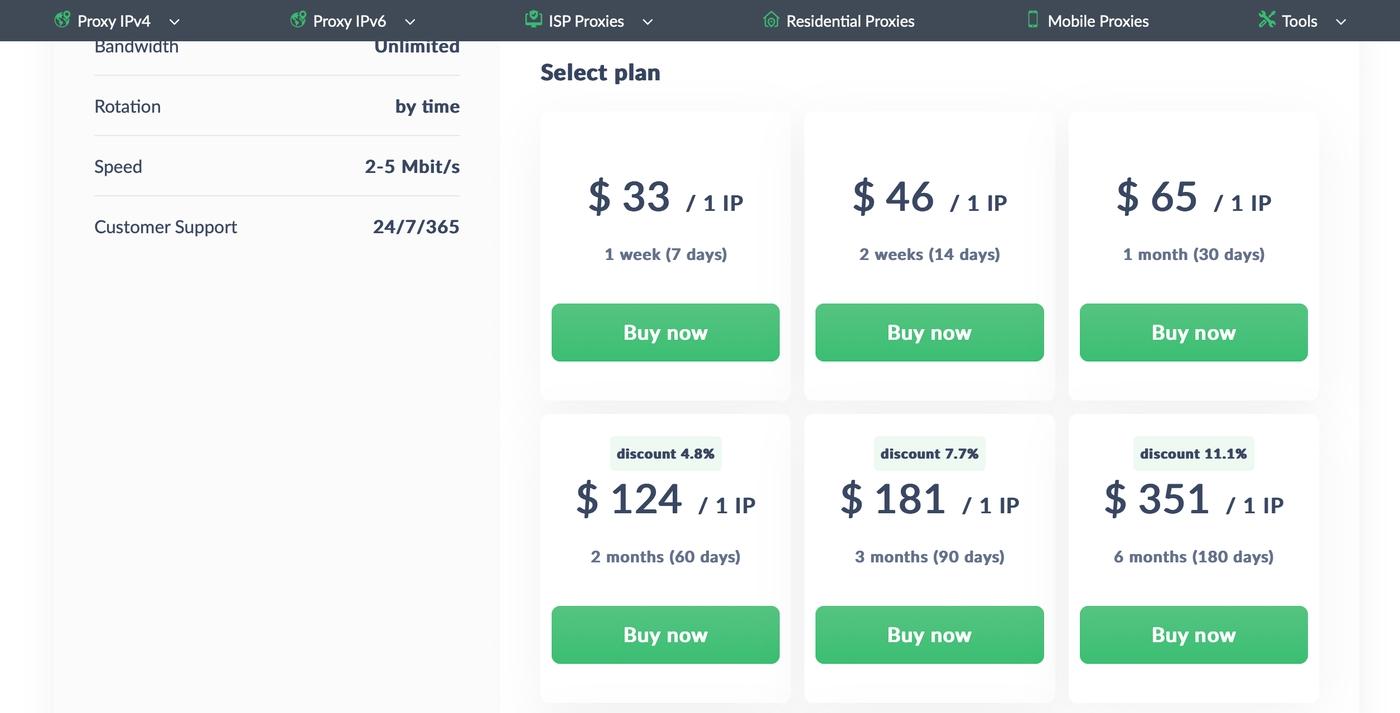 A T-Mobile (5G) proxy is the least affordable, priced at $90.00 for 7 days, $180.00 for one month, and $1,836.00 for a year. In other words, paying for a long-term subscription will help you save up to 17% in the case of US mobile proxies.
A T-Mobile (5G) proxy is the least affordable, priced at $90.00 for 7 days, $180.00 for one month, and $1,836.00 for a year. In other words, paying for a long-term subscription will help you save up to 17% in the case of US mobile proxies.
Additional Services and Costs
Proxy-Seller offers a range of additional (relatively simple yet helpful) tools that come free of charge. Those are online-based tools that are available to everyone. In other words, no registration is needed. Here’s a brief overview of what to expect:
- Proxy Checker allows you to check the performance of proxy servers and discover their type, level of anonymity, and location. It’s possible to check up to 100 proxy servers simultaneously, and retrieving results takes only a few seconds.
- Port Scanner lets you check for open ports, which helps you evaluate your PC’s protection level. As you probably know, an open port increases the risk of malware infection or someone accessing your device remotely.
- Ping Scanner, as its name implies, displays the time it takes for a data packet to be sent from one device and received on another.
- IP Address Checker allows you to check your device’s assigned IP address. It can also determine whether you have a proxy connection running in the background. This tool displays information about your system, browser, and location.
- IP Tracker scans and displays information on all intermediate routes to the end node, as Proxy-Seller explains. In other words, this tool lets you check for packet looks and failures in wireless networks.
Payment Methods & Money-Back Guarantees
Proxy-Seller supports a huge variety of payment methods. As you can expect, credit cards and payment services like PayPal and Stripe are supported. You can use a cryptocurrency if you need an anonymous way to sign up for this provider. Proxy-Seller currently supports Bitcoin, Ripple, Ethereum, Litecoin, Dash, Dogecoin, Tether, USDTTRC, BNB, AdvCash, and plenty more.
 Proxy-Seller’s refund policy heavily depends on your chosen subscription plan. You can’t ask for a refund if you opt for the provider’s 3-day trial ($1.99). If you get a 7-day plan, you must request a refund within the first 24 hours. Regarding longer-term plans, you have up to 72 hours to ask for your money back.
Proxy-Seller’s refund policy heavily depends on your chosen subscription plan. You can’t ask for a refund if you opt for the provider’s 3-day trial ($1.99). If you get a 7-day plan, you must request a refund within the first 24 hours. Regarding longer-term plans, you have up to 72 hours to ask for your money back.
Aside from that, you can only ask for a refund in specific scenarios. For example, if you can’t connect to an IP, if you don’t find a necessary IP location, or if you can’t find an IP suitable for your specific use case. There are plenty of rules to follow in this case, so we highly recommend checking Proxy-Seller’s refund policy.
Proxy-Seller’s account, interface and usability
In this segment of our hands-on Proxy-Seller, we’ll walk you through the initial sign-up procedure, setting up proxies, and obtaining data analytics. In other words, we’ll walk you through interacting with Proxy-Seller using its dashboard.
Registration & Initial Setup
To become a user of Proxy-Seller, you need to sign up for an account using the “Login” item on the website’s main menu. There are several ways to proceed; you can enter your e-mail address or use your Apple, Google, or Telegram account. Upon entering your email, the provider will let you access your dashboard immediately.
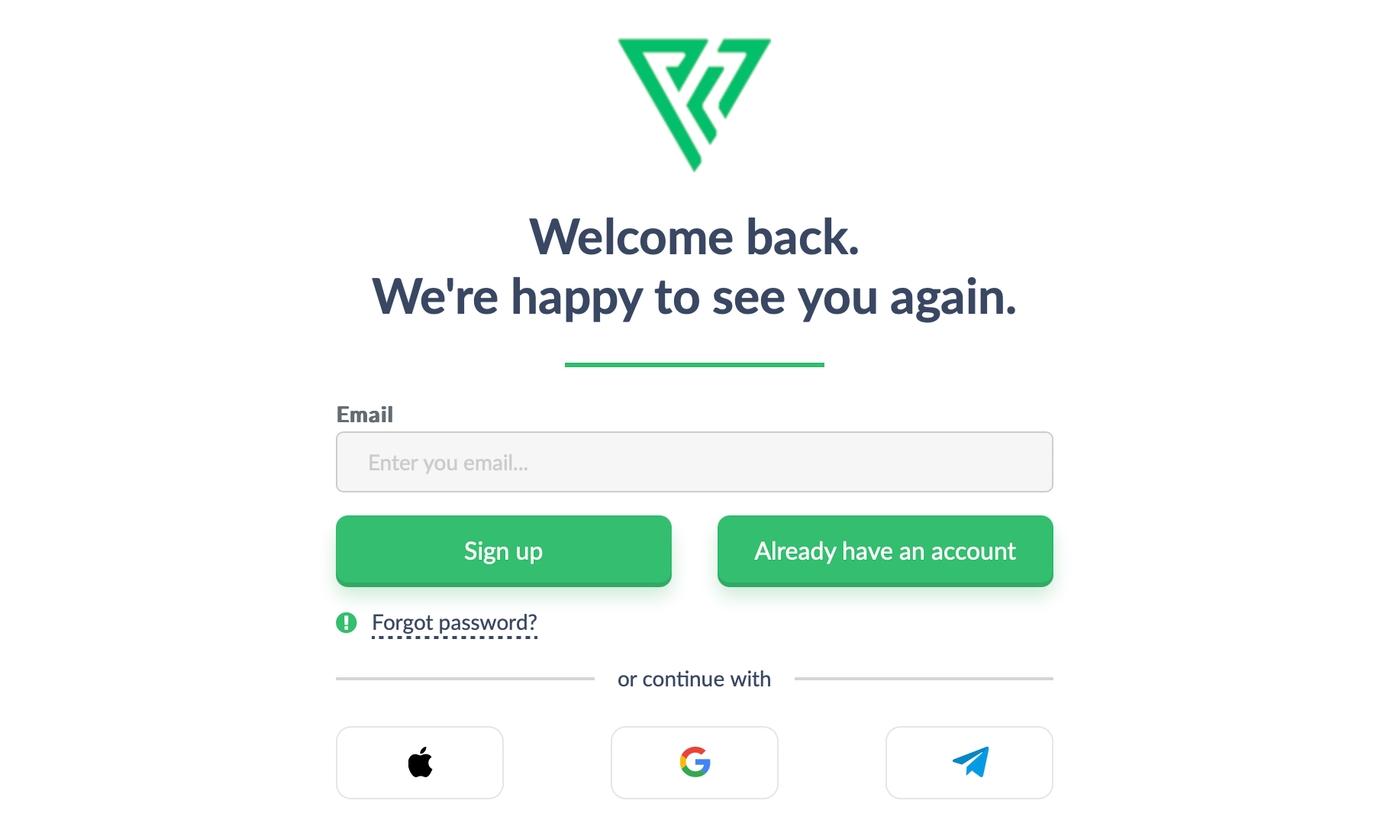 First, you’ll see your account’s basic options, where you can set up a password or enable two-factor authentication. We highly recommend setting up a password as soon as possible, as Proxy-Seller didn’t notify us via e-mail of our default password. Perhaps that was a one-time glitch, but we highly recommend setting up a password as soon as possible.
First, you’ll see your account’s basic options, where you can set up a password or enable two-factor authentication. We highly recommend setting up a password as soon as possible, as Proxy-Seller didn’t notify us via e-mail of our default password. Perhaps that was a one-time glitch, but we highly recommend setting up a password as soon as possible.
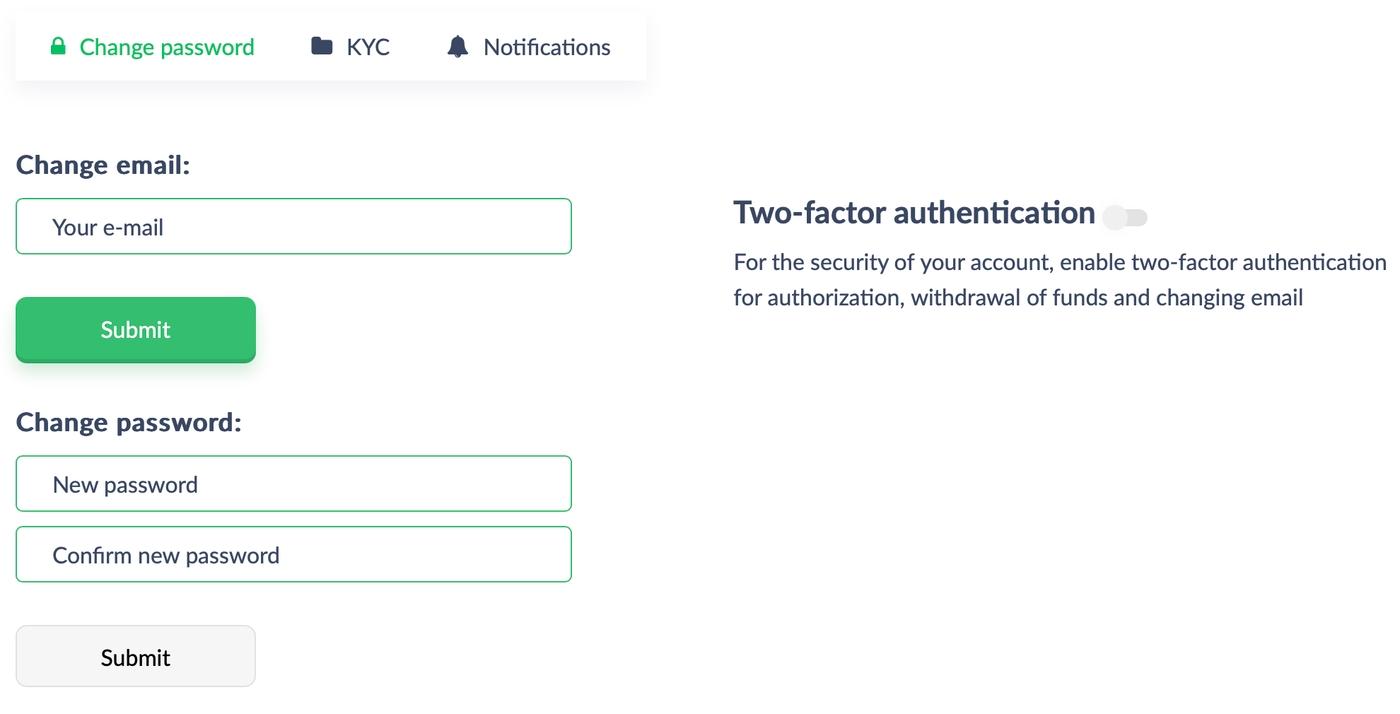 You can proceed by buying a subscription. The provider will then list all the available subscription plans. You’ll also need to pick a payment method, and you’ll see your chosen payment processor’s checkout page. Fill out the required fields, and you’ll return to your dashboard, ready to activate your proxies.
You can proceed by buying a subscription. The provider will then list all the available subscription plans. You’ll also need to pick a payment method, and you’ll see your chosen payment processor’s checkout page. Fill out the required fields, and you’ll return to your dashboard, ready to activate your proxies.
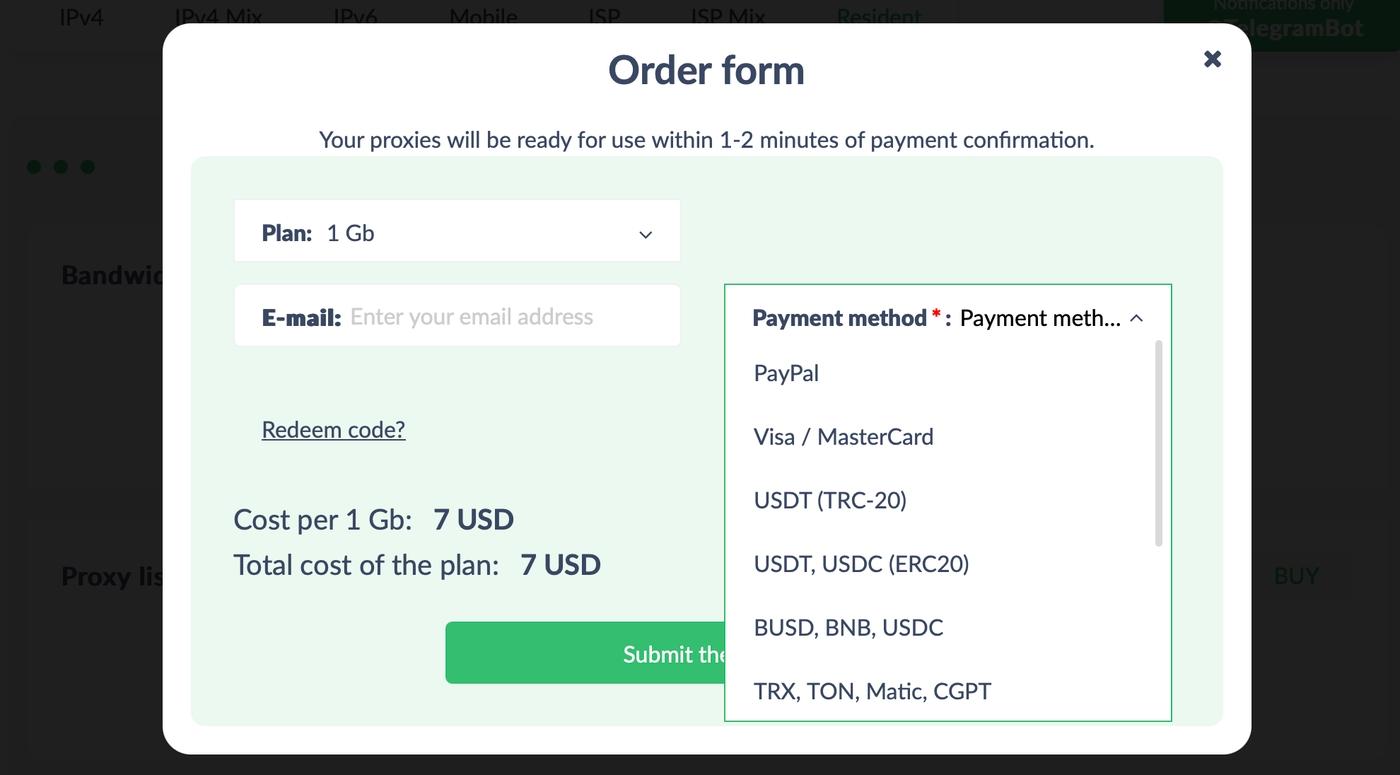 We also understand that many of you would like to test-drive Proxy-Seller before getting a subscription. To do that, head over to the provider’s 3-day trial page. There, you can get a plan that lets you access residential proxies for 3 days and 200MB. This isn’t too generous but should be enough to get some basic experience of how the proxy provider works.
We also understand that many of you would like to test-drive Proxy-Seller before getting a subscription. To do that, head over to the provider’s 3-day trial page. There, you can get a plan that lets you access residential proxies for 3 days and 200MB. This isn’t too generous but should be enough to get some basic experience of how the proxy provider works.
Profile & Settings
Before you start interacting with proxies, we highly recommend checking out the provider’s dashboard, where you’ll find plenty of things to fine-tune and optimize. That said, the first tab you’ll see on your dashboard is called “Profile,” and this is where you can change your e-mail, set up a new password, and enable two-factor authentication. You can also go through the Proxy-Seller’s KYC (Know Your Customer) procedure, which is recommended for companies.
 The ”Orders” tab lets you set up different proxies, which we’ll explain in the next segment of this review. If you click on the “Balance” tab, you’ll get to deposit a certain amount, which can be later deducted based on your subscription plan and any extras you might purchase. It’s possible to use all of the Proxy-Seller’s supported payment methods to add funds to your account.
The ”Orders” tab lets you set up different proxies, which we’ll explain in the next segment of this review. If you click on the “Balance” tab, you’ll get to deposit a certain amount, which can be later deducted based on your subscription plan and any extras you might purchase. It’s possible to use all of the Proxy-Seller’s supported payment methods to add funds to your account.
 The ”History” tab allows you to review your purchase history, giving you a clear insight into what you’ve purchased and the cost of each item. This tab also allows you to review the history of any IP address you’ve requested. There are also two additional tabs; the “FAQ” tab lets you review the provider’s support documentation, while the “API” tab allows you to set up API access from a specified IP address.
The ”History” tab allows you to review your purchase history, giving you a clear insight into what you’ve purchased and the cost of each item. This tab also allows you to review the history of any IP address you’ve requested. There are also two additional tabs; the “FAQ” tab lets you review the provider’s support documentation, while the “API” tab allows you to set up API access from a specified IP address.
All in all, Proxy-Seller doesn’t have the most attractive-looking user dashboard. In many ways, its design is outdated. Also, many of the options you can fine-tune lack proper explanation, making them less suitable for inexperienced users. That said, if you have some experience using proxies, you’ll find your way through the dashboard without too many issues.
Managing Proxies
To get started with Proxy-Seller’s proxies, click the “Orders” tab on your dashboard. You’ll see a sub-tab where different proxy types are listed. Once you click the type of proxy whose subscription you’ve purchased, you’ll see options to set up your first connection. We’ve tested residential proxies, so what follows applies to that side of Proxy-Seller.
 Setting up a residential proxy connection requires you to scroll to the bottom, where you’ll see a segment named “Export.” You can input the name of your connection or proxy list, select the type of IP rotation (general, sticky, or rotating), authorization method (username and password, or based on a specific IP address), export format (file or link), and you can then go through location filtering options.
Setting up a residential proxy connection requires you to scroll to the bottom, where you’ll see a segment named “Export.” You can input the name of your connection or proxy list, select the type of IP rotation (general, sticky, or rotating), authorization method (username and password, or based on a specific IP address), export format (file or link), and you can then go through location filtering options.
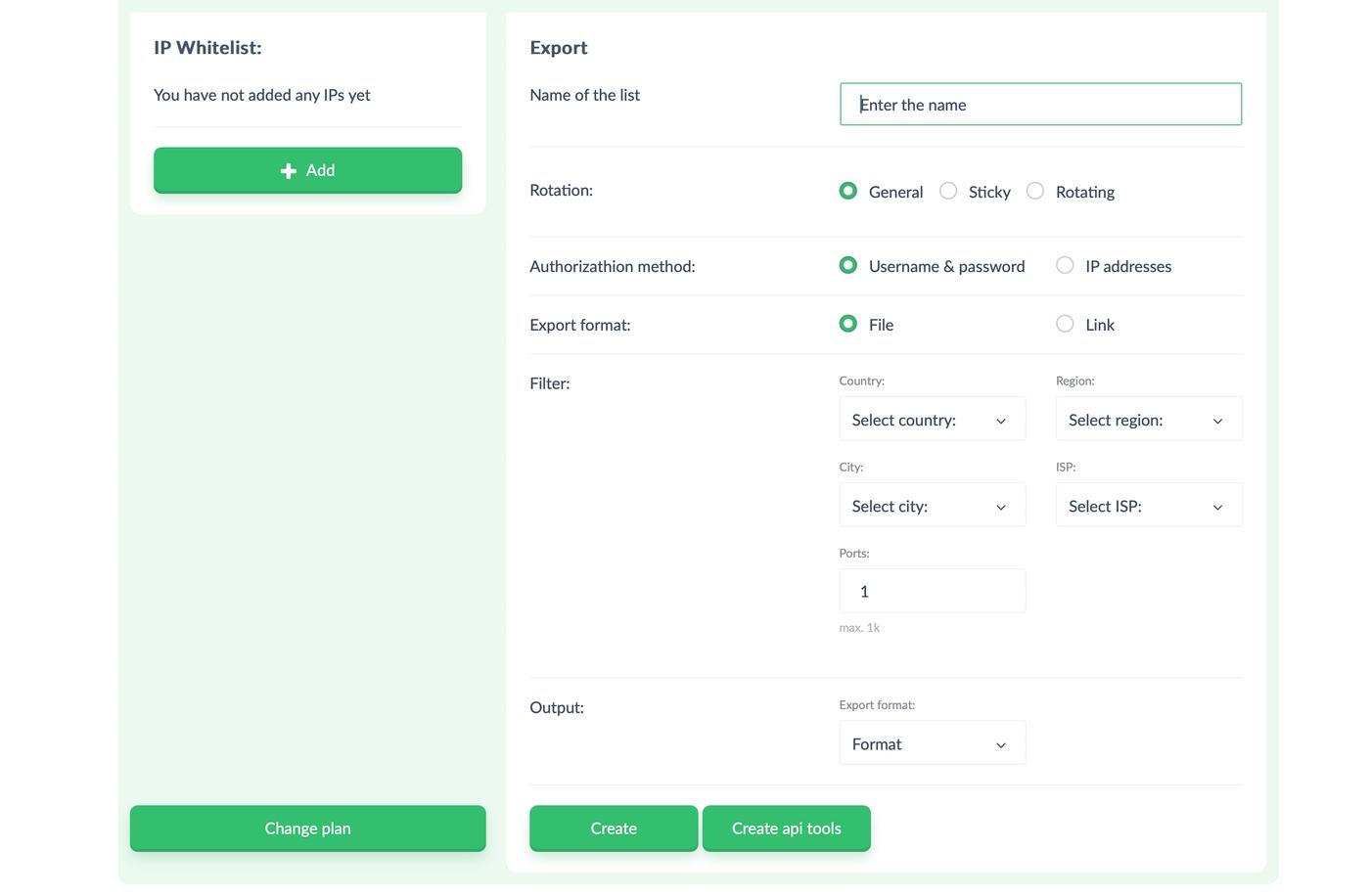 Location filtering is where Proxy-Seller truly shines. Pick a country first, and a list of regions will appear. Then, you can also select a specific city and even a specific Internet service provider. Therefore, you can set up your proxy connection based on specific targets.
Location filtering is where Proxy-Seller truly shines. Pick a country first, and a list of regions will appear. Then, you can also select a specific city and even a specific Internet service provider. Therefore, you can set up your proxy connection based on specific targets.
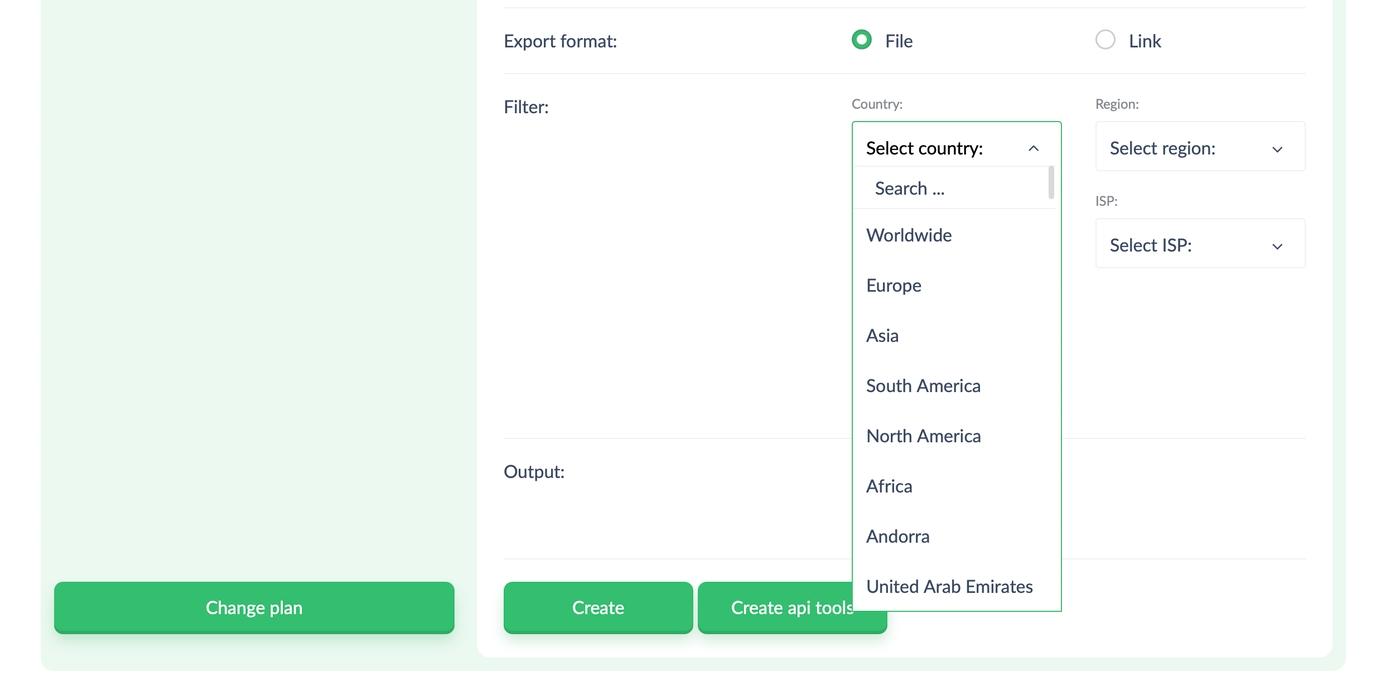 Lastly, you can pick an output format. There will be a range of predefined formats (text, CSV, and others), but you can also set up a custom output format. As you can see, this provider genuinely offers many options when setting up a proxy connection based on various parameters.
Lastly, you can pick an output format. There will be a range of predefined formats (text, CSV, and others), but you can also set up a custom output format. As you can see, this provider genuinely offers many options when setting up a proxy connection based on various parameters.
 At this moment, you can scroll up. You’ll see a segment called “Proxy List” listing your proxies. This is where you’ll find the information needed to set up your first connection based on how you plan to use it. For example, you can set up a proxy connection on your device using your web browser or third-party integration.
At this moment, you can scroll up. You’ll see a segment called “Proxy List” listing your proxies. This is where you’ll find the information needed to set up your first connection based on how you plan to use it. For example, you can set up a proxy connection on your device using your web browser or third-party integration.
Data / Usage Tracking
Once you start using your proxy connection, Proxy-Seller will allow you to check statistics in real-time. We’ll remind you that we’ve tested residential proxies, so you might see different statistics for different proxy types.
To check your proxies’ stats, use the “Orders” tab and pick the type of proxies that you’ve signed up for. At the top, you’ll see basic bandwidth statistics regarding how much data is left in your plan. You can see how much bandwidth you’ve used and how much there’s left. To check more detailed stats, click “Consumption History.”
 A new window will now open with a graph showing your usage data, consumption, and your plan’s limits. Look below the graph to input a specific time range to get detailed stats. Then, you can decide whether you’d like to preview it or download a file to process it in another way.
A new window will now open with a graph showing your usage data, consumption, and your plan’s limits. Look below the graph to input a specific time range to get detailed stats. Then, you can decide whether you’d like to preview it or download a file to process it in another way.

We’ll also add that detailed statistics are available for the last 3 months of your usage. That said, most other providers offer more detailed statistics and analytics, giving you more information on optimizing your future proxy usage. Proxy-Seller does a good job of covering the basics, but more detailed analytics would be a welcome change in the future.
Possible Use Cases
Proxy-Seller’s extensive features make it suitable for a wide range of users. These include web scraping, cybersecurity, multi-accounting, gaming, and even integrating its proxies with sneaker bots. Let’s take a brief overview of those potential uses.
Web Scraping
Thanks to Proxy-Seller’s sizable pool of IPs, you won’t have to worry about rate limits or scalability of your web scraping operations. It’s true that Proxy-Seller offers millions of residential IPs and that its pool of ISP and datacenter proxies is more limited. However, they’re still highly efficient for bypassing CAPTHAs, avoiding IP bans, and reaching publicly available targets with little to no effort.
Cybersecurity
By serving as an intermediary between users and the Internet, Proxy-Seller can help your organization increase anonymity and privacy by hiding users’ IP addresses. As such, it can protect against targeted attacks and unauthorized data collection. When combined with specialized third-party software, it’s also possible to protect against malicious traffic, implement access control, and more.
Gaming
Proper multi-accounting is never done without a reliable proxy solution. In that sense, this provider can help obtain unique IP addresses to minimize the risk of detection. In other words, you’ll get to use multi-accounting tools to avoid IP detection, access geo-restricted content, and enhance your security. Integrating Proxy-Seller with tools like GoLogin or Multilogin is a piece of cake.
Ad Verification
High-performing proxies can reduce ping and latency by routing traffic through a proxy server closer to the game server. Also, you can utilize Proxy-Seller to upgrade your security, hide your IP address, and keep DDoS attacks away. You can use proxies to bypass geo-blocks, obtain region-specific rewards, skins, and cosmetics, and unlock new games before they’re available in your time zone.
Sneaker Bots
Proxy-Seller offers smooth integration with a wide range of sneaker bots. Using those, you can create a filter between your IP address and the retailer’s website, allowing multiple purchase attempts without exposing your privacy. Aside from taking care of your security, Proxy-Seller helps bypass geo-blocks, perform IP rotation, and manage multiple accounts.
Documentation / Knowledge Base and Tutorials
Even though Proxy-Seller offers plenty of resources to teach you about proxies and using its services, it fails to provide user-friendly navigation. In most cases, we recommend relying on Google to find setup guides and technical documentation on the provider’s website, or you can always contact the provider via live chat.
Setup Guides
 Proxy-Seller’s setup guides cover extensive information on the basics of proxies, including how to set them up on Windows, macOS, and Linux and how to use proxy managers for Chrome, Opera, Edge, Safari, Tor, Firefox, and the Yandex Browser. You’ll also find information on setting up proxies on Android and iOS and using tools like Proxy Switcher and Proxifier. These guides are nicely written, but they lack screenshots.
Proxy-Seller’s setup guides cover extensive information on the basics of proxies, including how to set them up on Windows, macOS, and Linux and how to use proxy managers for Chrome, Opera, Edge, Safari, Tor, Firefox, and the Yandex Browser. You’ll also find information on setting up proxies on Android and iOS and using tools like Proxy Switcher and Proxifier. These guides are nicely written, but they lack screenshots.
Technical Documentation
 While top-rated providers typically offer in-depth documentation, Proxy-Seller covers the basics mostly. You can learn about authorization, various actions with proxies (like retrieving active proxies, IP replacement, exporting IPs, etc.), and handling proxy-related actions using PHP, NodeJS, Phyton, Java, and Golang. These tutorials are mostly short and lack screenshots, but they do come with code examples.
While top-rated providers typically offer in-depth documentation, Proxy-Seller covers the basics mostly. You can learn about authorization, various actions with proxies (like retrieving active proxies, IP replacement, exporting IPs, etc.), and handling proxy-related actions using PHP, NodeJS, Phyton, Java, and Golang. These tutorials are mostly short and lack screenshots, but they do come with code examples.
FAQ
 If you’re new to using proxies, we highly recommend starting with Proxy-Seller’s FAQ section. This is where you’ll find the basics of every proxy type supported and their possible use cases. As you can imagine, FAQs provide quick and short answers, but they can be quite beneficial in understanding different proxy types.
If you’re new to using proxies, we highly recommend starting with Proxy-Seller’s FAQ section. This is where you’ll find the basics of every proxy type supported and their possible use cases. As you can imagine, FAQs provide quick and short answers, but they can be quite beneficial in understanding different proxy types.
Blog
 Proxy-Seller treats its blog as another way to provide technical info and setup guides. So, instead of focusing on teaching about proxies and web scraping, as most similar blogs do, this one teaches you how to use third-party tools. For example, you’ll find detailed guides on setting up tools like ClonBrowser, Omnilogin, BitBrowser, MuLogin, Hidemyacc, Antik Browser, and more – with screenshots included.
Proxy-Seller treats its blog as another way to provide technical info and setup guides. So, instead of focusing on teaching about proxies and web scraping, as most similar blogs do, this one teaches you how to use third-party tools. For example, you’ll find detailed guides on setting up tools like ClonBrowser, Omnilogin, BitBrowser, MuLogin, Hidemyacc, Antik Browser, and more – with screenshots included.
Customer Support and User Reviews
This segment of our in-depth Proxy-Seller review will explain the available customer support channels. Furthermore, we’ll report on the provider’s reputation regarding publicly available user reviews. Let’s dive right in!
Customer Support Channels
The easiest way to contact Proxy-Seller’s team is to initiate a live chat session. This option is available on each page of the provider’s website. You’ll be greeted by a bot that asks you to describe your issue or question, but an agent will be waiting in the background. We talked with Proxy-Seller’s team multiple times and never waited in a queue for more than a few minutes.
 We also have to note that the Proxy-Seller’s support team seems very knowledgeable. They responded promptly to each question and often added supplemental links for additional information.
We also have to note that the Proxy-Seller’s support team seems very knowledgeable. They responded promptly to each question and often added supplemental links for additional information.
Aside from using live chat, you can also contact Proxy-Seller in other ways. For example, you can send a message through the provider’s website, send an e-mail, or use Skype or Telegram to report your issue. Furthermore, we’d also like to note that Proxy-Seller has a rich presence on social media, so you can contact them via Facebook, YouTube, Discord, and Reddit.
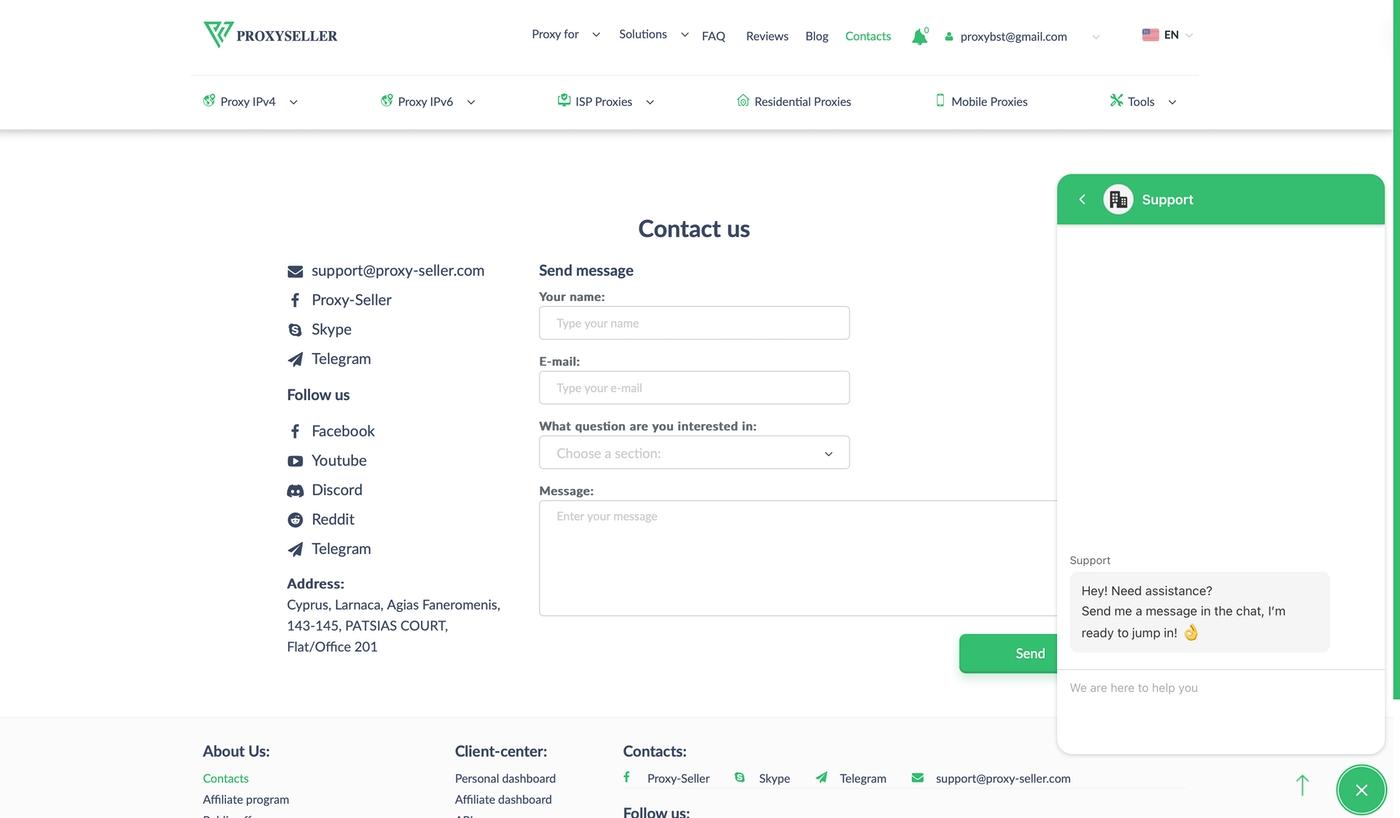 Overall, the provider seems to be doing a fantastic job of offering customer support. You can count on multiple communication channels available 24/7, and your questions will reach a responsive and knowledgeable support team.
Overall, the provider seems to be doing a fantastic job of offering customer support. You can count on multiple communication channels available 24/7, and your questions will reach a responsive and knowledgeable support team.
User Reviews & Trustworthiness
When researching user reviews and trustworthiness, we rely on sites like Trustpilot and G2, sources of helpful and verified information. Proxy-Seller has a score of 4.6 out of 5.0 on Trustpilot, with more than 600 reviews published. Thus, it’s obvious that Trustpilot is a reputable proxy provider.
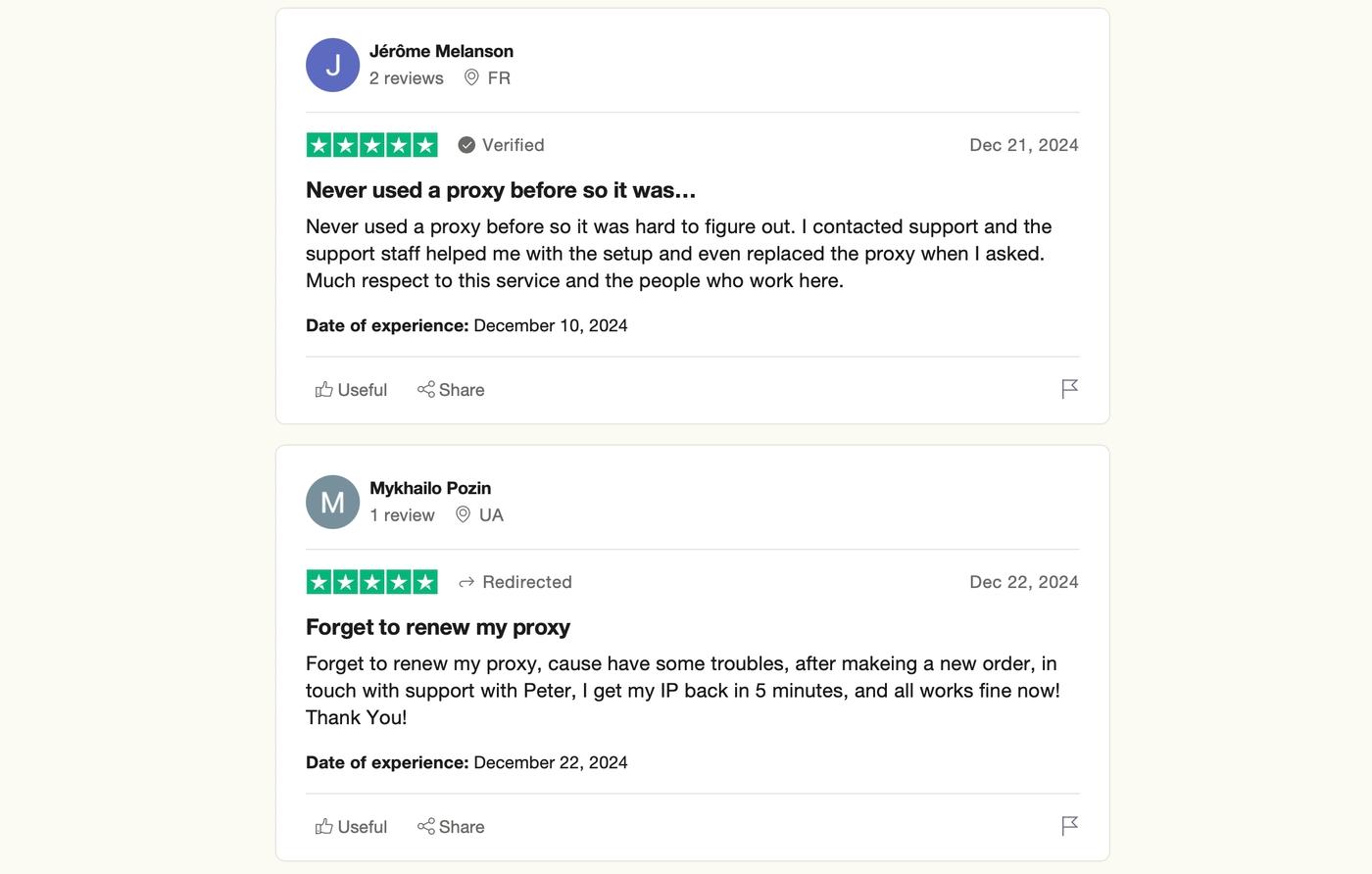 We’ll add that many users praise the provider’s customer support, and we fully agree with those statements. Other reviews mentioned the provider’s reasonable prices, easy-to-use interface, and speed in setting up proxy connections. Negative reviews mainly address issues with flagged IPs, but remember that Proxy-Seller offers free replacements.
We’ll add that many users praise the provider’s customer support, and we fully agree with those statements. Other reviews mentioned the provider’s reasonable prices, easy-to-use interface, and speed in setting up proxy connections. Negative reviews mainly address issues with flagged IPs, but remember that Proxy-Seller offers free replacements.
 On G2, Proxy-Seller scores 4.7 out of 5.0 with 50+ user reviews. Once again, it’s evident that many have positive things to say about this provider. Even on G2, people praise the provider’s customer support, the quality and variety of proxies, and the affordable pricing. We’ve also seen negative reviews focusing on connection issues, speed, and the inability to target every US state.
On G2, Proxy-Seller scores 4.7 out of 5.0 with 50+ user reviews. Once again, it’s evident that many have positive things to say about this provider. Even on G2, people praise the provider’s customer support, the quality and variety of proxies, and the affordable pricing. We’ve also seen negative reviews focusing on connection issues, speed, and the inability to target every US state.
Conclusion
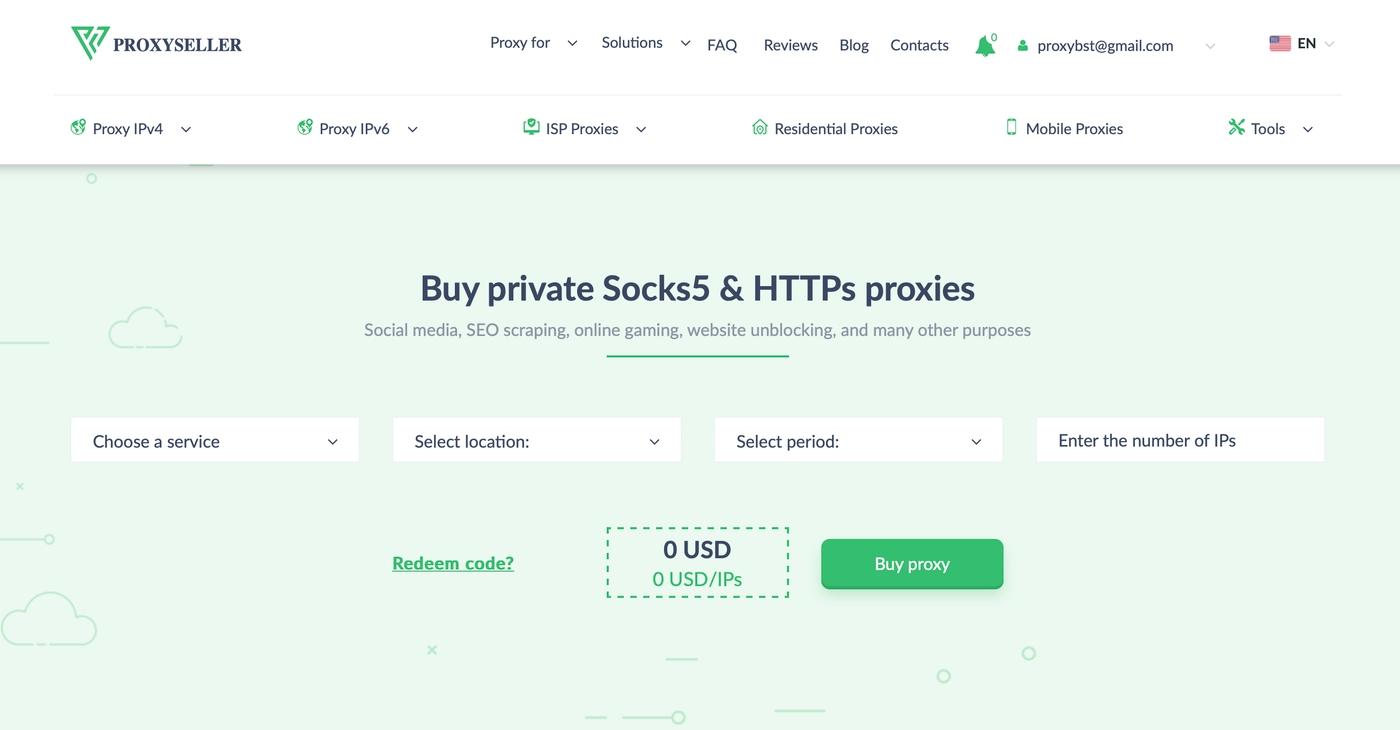 Overall, Proxy-Seller has many tricks up its sleeve, and it’s evident that it has a long history. It’s true that its competitors are very quick in developing new features, powered mainly by AI these days, but Proxy-Seller focuses on the essentials. In other words, you can expect a sizable pool of IPs, various proxy types, affordable prices, and reliable customer support.
Overall, Proxy-Seller has many tricks up its sleeve, and it’s evident that it has a long history. It’s true that its competitors are very quick in developing new features, powered mainly by AI these days, but Proxy-Seller focuses on the essentials. In other words, you can expect a sizable pool of IPs, various proxy types, affordable prices, and reliable customer support.
Therefore, Proxy-Seller doesn’t have too many bells and whistles, but it gets the job done practically without effort. Of course, not everything is excellent. This provider still has some work to do to refine its user dashboard, make it more user-friendly, and offer more in-depth real-time analytics. We also hope for better organized documentation as well.
However, the bottom line is that Proxy-Seller is undoubtedly worth your time and money, especially if you need high-end geo-targeting at an affordable cost. There aren’t many alternatives that can compete with Proxy-Seller in that sense.
